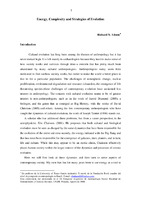| dc.rights.license | Licencia de Creative Commons Reconocimiento-NoComercial-CompartirIgual 4.0 Internacional (CC BY-NC-SA 4.0) | |
| dc.creator | Adams, Richard N. | |
| dc.date.accessioned | 2014-05-22T21:37:29Z | |
| dc.date.accessioned | 2019-08-21T15:38:51Z | |
| dc.date.available | 2014-05-22T21:37:29Z | |
| dc.date.available | 2019-08-21T15:38:51Z | |
| dc.date.issued | 2009-07-01 | |
| dc.identifier.issn | 1851-1694 | |
| dc.identifier.other | RA-075 | |
| dc.identifier.uri | https://hdl.handle.net/20.500.12219/1618 | |
| dc.identifier.uri | http://www.ava.unam.edu.ar/images/14/pdf/ava14_conf_adams.pdf | |
| dc.description | Fil: Adams, Richard N. University of Texas-Austin; Estados Unidos. | es_AR |
| dc.description.abstract | Cultural evolution has long been among the themes of anthropology but it has never ranked high. It is left mainly to archaeologists because they have to make sense of how society works and survives through time–a concern that has pretty much been abandoned by many cultural anthropologists. Anthropologists today seem little motivated to find out how society works, but rather to make the world a better place to live in for a particular population. The challenges of atmospheric change, nuclear proliferation, environmental degradation and resource exhaustion, the emergence of life threatening species–these challenges of contemporary evolution have awakened less interest in anthropology. The concern with cultural evolution seems to be of greater interest to non-anthropologists, such as in the work of Jarrod Diamond (2005), a biologist, and the genre that as emerged as Big History, with the works of David Christian (2005) and others. Among the few contemporary anthropologists who have sought the dynamics of cultural evolution, the work of Joseph Tainter (1996) stands out. | en |
| dc.format | application/pdf | |
| dc.language.iso | eng | en |
| dc.publisher | Universidad Nacional de Misiones. Facultad de Humanidades y Ciencias Sociales. Secretaría de Investigación y Postgrado. Programa de Postgrado de Antropología Social | es_AR |
| dc.rights.uri | http://creativecommons.org/licenses/by-nc-sa/4.0/deed.es | |
| dc.source | Universidad Nacional de Misiones. Facultad de Humanidades y Ciencias Sociales. Secretaría de Investigación y Postgrado. Programa de Postgrado en Antropología Social (Julio 2009). Avá, Revista de Antropología. Posadas : Programa de Postgrado en Antropología Social. (14). pp. 1-33. Disponible en: http://www.ava.unam.edu.ar/index.php | |
| dc.subject | Cultural | es_AR |
| dc.subject | Anthropology | en |
| dc.subject | Society | en |
| dc.subject | Energy | en |
| dc.title | Energy, Complexity and Strategies of Evolution | en |
| dc.type | info:eu-repo/semantics/article | |
| dc.type | info:ar-repo/semantics/artículo | |
| dc.type | info:eu-repo/semantics/acceptedVersion | |




